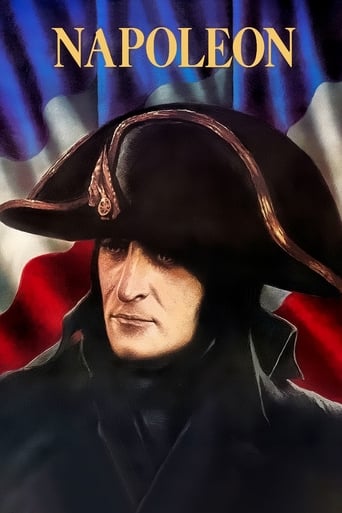mlink-36-9815
I saw it in 1978 Shrine Auditorium & it was great. Then later on I got a bootleg off British TV with Carl Davis. Finally the DVD from BFI. The photographic quality has improved immensely and there are many differences between the two Carl Davis versions. It seems like a new movie. I'm halfway thru the DVD Act 3. I'm wondering how or if the triptych footage comes out. The 3 giant screens live cannot be beat.I'm in a unique position to talk about Napoleon as I own all 3 versions. Kevin Brownlow reformatted the titles making new more accurate translations from French. The original french titles took for granted you knew the facts of the revolution & the new titles explain it more. + some of the titles where handwritten but replaced in translation by typewritten titles. in the DVD the handwritten titles are replaced by handwritten translations. in the British TV version scenes are tinted and in the DVD they are b/w? Its quite possible they received original footage and the tinting was not accurate.Brownlow also was able to get 1st generation footage of export negatives where it shows a different angle & distance but the clarity is increased by a lot. I did not listen to Davis' music (hard to believe) but I watched at night to as not to annoy neighbors.On the British TV bootleg, the triptych was missing but on the DVD it was there. There was triptych footage early in the film and you could see the edges of the screen. It was decided to save all the triptych until the end. The TV bootleg is very important and valuable to have as students of the film to find out how all this is done
[email protected] and it can be got thru a trade.
rdjeffers
March 24, 25, 31 and April 1, 1:30pm, The Paramount, Oakland The Eagle of Destiny The life of Napoléon Bonaparte as the heroic savior of France is revealed from age ten to twenty-seven. Beginning with his boyhood at military school in Brienne, Boneparte is viewed as an outcast and a leader. Emerging as a young officer during the Revolution, the adult Boneparte (Albert Dieudonné) is first seen in Paris at the Club des Cordeliers where Danton introduces La Marseillaise to the mob as their national anthem. Bonaparte then attempts to unify his native Corsica, survives The Terror, becomes the hero of Toulon and embarks on his conquest of Italy.Directed by Abel Gance, Napoleon (1927) was initially conceived as the first of six chapters on the life of Bonaparte. Cut by MGM from an original 29 reels to eight for its 1929 American release (with von Stroheim's Greed a fresh memory), restoration of Napoleon became the life work of film preservationist Kevin Brownlow in 1954.
Ninja Doll
My recollection of "Napoleon" is of a wonderful evening of first-rate movie and first-rate score, with Gance's work on three screens and Carmine Coppola conducting a full orchestra. While it may not do justice to the continually evolving cinematic extravaganza described in the other review, it is nonetheless the version I've grown up with and viewing it remains one of my favorite life experiences.I applaud anyone who has had a hand in this project and has continued to update, revise, and otherwise revisit this very noble film. It seems to have taken on a life of its own in terms of restored versions. The newly performed work may be superior to Coppola's initial resurrection but without Coppola's vision, would it have become the phenomenon it is today? I'm pretty sure he's entitled to protect his initial investment (of time, energy, money, and media) even as the movie itself changes with each new find. In the end, the consumer (from any country) will seek out the version he wishes to own -- passing judgement by consumption.I would not hesitate to acquire both versions, frankly. It's not about who did the better job, it's about the evolution of the film since it was first dusted off.
donelan-1
I saw this film in its restored original form, with 3 projectors for the triptych scenes, and with the original Arthur Honegger score played on one of the few surviving giant theater organs. It is still an unforgettable cinematic experience. Eisenstein and other Russian filmmakers were dazzled by Gance's technique when a print of the film found its way to Moscow. Gance re-edited Napoleon as a sound film in 1934, using the original actors to dub in the voices and adding some new scenes. The lip synch is perfect, because Gance (unlike most silent film directors)made his actors speak all their lines. The DVD (which is long overdue)should include both the silent and the sound versions of the film, and use Honegger's score. He was a major 20th Century composer, contemporary with Gance, who spent most of his career in France; so his music really belongs with the film.






